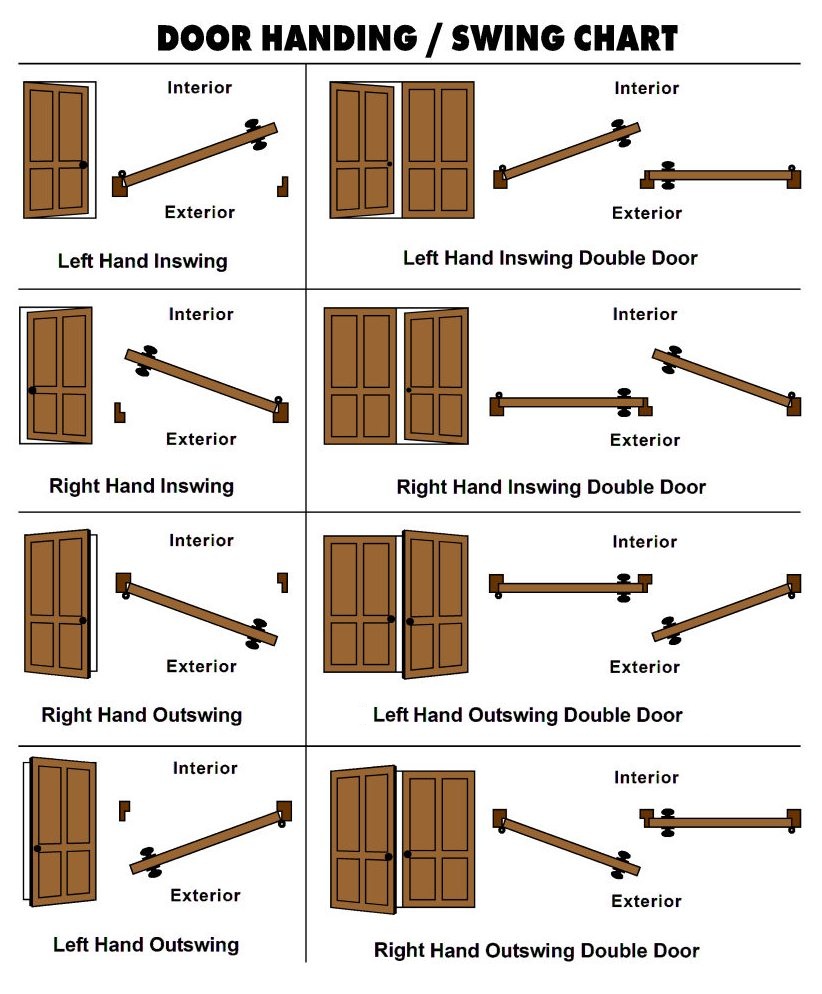Are you able to make custom wood and iron doors?
Yes, we have access to custom build specific sizes, styles and wood species.
How often does a wood door need to be refinished?
It all depends on the door’s exposure to the elements and the type of wood. A stained wood door should be treated like a piece of furniture. If your door is being exposed to direct sunlight or precipitation, the finish should be checked periodically for signs of fading and refinished accordingly. If your door is receiving a large amount of direct sun and/or precipitation, you may have to refinish as often as 1-2 times a year. If your door gets little to no sun or rain, the finish should last years. We do recommend wiping down your wood door with a furniture polish at least once a month to help preserve the finish.
What is a Door Swing?
Reference this guide:

What is a pre-hung door?
A prehung door is a door which is provided with a jamb. Jambs for interior doors typically come with the frame and hinges. Jambs for exterior doors typically include the frame, hinges, weatherstripping, a threshold, and exterior trim.
What is an unfinished slab door?
An unfinished slab door is a door that has not been stained or sealed and has not been cut at all. In order for slab door to be installed, it must be cut to the correct width and height, have the area for the hinges mortised out, and have the hole(s) cut for hardware. The door is then considered to be machined or “bored and mortised”.
What does bore mean?
The bore of a door refers to the lock preparation and machining of the door (the holes that are cut for the hardware). The industry standard for a residential exterior door is two holes, 5-1/2″ center to center, 2-3/8″ backset, with a 2-1/8″ diameter. Commercial doors typically have a 2-3/4″ backset. Doors can also be bored for a mortise lock. This type of lock prep varies between different hardware manufacturers and models. We must have the mortise lock in our possession to machine a door for a mortise lock, and the standard charge is $165.
What is jamb thickness?
Jamb thickness is the depth of the jamb, which is determined by the thickness of the wall. The exterior and interior trim is not included when calculating the jamb thickness. For example, a wall that is framed using standard 2×4’s with 1/2″ sheetrock and 1/2″ exterior sheathing has a depth of 4-1/2″ and will typically require a 4-5/8″ jamb thickness. The extra 1/8″ allows for easier mounting of the trim.
What does a jamb come with?
An exterior wood door jamb purchased from The Front Door Co. comes with the wood jamb legs and header, hinges, kerf weatherstripping, a bronze adjustable sill threshold (for inswing doors) or a bronze bumper type (for outswing doors), and WM180 profile brick mould or 1×4 exterior trim. A bronze finish low profile ADA compliant threshold is available upon request. Interior trim is sold separately.
When purchasing an exterior door unit, we offer standard double bore lock prep at no additional charge (5-1/2″ center to center bore, 2-3/8″ backset, 2-1/8″ diameter holes). Prep for most mortise locks is available for a $165 charge, and the lock must be provided to us.
Interior jambs come with the jamb legs, header, and hinges. Trim is sold separately. A single bore for a passage lock is included when purchasing an interior jamb (2-1/8″ diameter, 2-3/8″ backset).
Installation FAQs
Do I need to move my furniture?
Not necessarily. Our installers typically need a minimum of 4-5 feet of space on the inside of the doorway. If any furniture is within that space, we may ask that you have it moved prior to the installation. If it a small item, our installer can move the item at the time of installation. Computers and other electronic equipment in the immediate area should be covered or relocated.
Do you clean up after the installation?
Yes. It’s a reality of remodeling that construction work causes disruption and can create a mess. We do our best to minimize any disruption during the project and we clean up once the job is complete. Upon completion of the job please survey your house for any issues we may have overlooked and they will be addressed.
Do you need to cut my walls to install the door unit?
No (in most cases). Most jobs require no cutting of your existing moldings or walls. We typically install our doors into existing openings. In the rare case we have to cut or modify the wall or opening, we will go over the scope of work and what should be expected.
How does the EPA Lead Safety Law effect the installation?
The EPA requires lead safe practices on all homes constructed before 1978 in which lead based paint is present. It guarantees the installation is done properly and ensures the health and safety of your family. We will contain the work area to prevent lead exposure beyond the site. We use construction methods that minimize the creation of dust. We clean the work area of dust, wood chips, and construction debris before exiting the work zone. We bag and remove from your property old materials and debris that could be contaminated by lead and properly dispose of it.
What is the lead time from Inspection/Deposit to Installation?
After your order has been placed and the measurements have been verified, the door unit measurements are immediately submitted and your unit is typically installed within 4-6 weeks (6-8 weeks for custom or Iron door unit orders). The average job is completed in a day. Please keep in mind these are average time frames and can fluctuate depending on the time of year, our current workload, and situations beyond our control, such as supplier back-orders, natural disasters, etc.
What happens to my old doors?
We can remove and haul away the old doors from your property. If you would like to keep the old door or hardware, please let your sales representative know at the time the order is placed or sometime prior to the installation.
What if my current doors have security alarms?
We have experience removing and reinstalling the contact sensors from the existing door and typically do this as a courtesy included in our installation. If the jamb is being replaced, you should notify your alarm company to let them know you are having your door replaced and see if they have any specific instructions or recommendations. Please keep in mind you may need to have your alarm company repair or re-establish the system connection in the case there are any issues during or after our installation.
Will my installation be postponed if the weather is bad?
We may postpone the installation in the event of severe weather conditions if we feel it will affect our ability to complete the job in a safe and clean manner. In the event of heavy rain or high winds, we may call to reschedule your installation.

